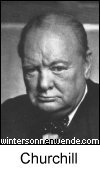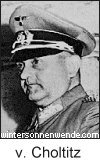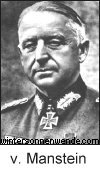  |
Worm in the Apple
German Traitors and Other Influences
That Pushed the World Into War:
The little-known story of the men who destroyed Adolf Hitler's Germany
Friedrich Lenz
14. Views on the assassination attempt
and the would-be assassins
In light of the briefly popular tendency to defend the assassination attempt, albeit on the whole
in
very general and vague terms, the following will quote the assessments of responsible and
competent individuals.
1. In the monthly periodical Nation Europa, issue
I/9, Admiral Hermann Boehm, war-time Commander-in-Chief in Norway, wrote about
the deed of July 20:
"Incidentally, I condemn the act of July 20 because, objectively speaking, it was based on a
completely incorrect assessment of the situation in terms of both foreign and domestic
policy.
 a) In terms of foreign policy, no different attitude on
the part of the victorious powers could have been expected even if the assassination had been
successful. As early as November 1939, Churchill said in a radio address to the British people:
'This war is a British war and its goal is the destruction of Germany.' (Source: Sven Hedin,
America in the War of the Continents.) Note: not 'the
destruction of National-Socialism', but 'the destruction of Germany'! A single unbroken chain of
the wish for destruction leads from there to Potsdam via Casablanca, Yalta and the Morgenthau
Plan. Just read Churchill's account, in his memoirs, of his discussion with Stalin (August 1942)
about the deliberate bombing of the German civilian population; just read Churchill's cynical
speeches about the intended forcible expulsion of millions of Germans from their ancestral
homes!
If Hitler had died in 1944, his death would have changed nothing in the designs of the victors, in
their manner of warfare, or in our national fate. a) In terms of foreign policy, no different attitude on
the part of the victorious powers could have been expected even if the assassination had been
successful. As early as November 1939, Churchill said in a radio address to the British people:
'This war is a British war and its goal is the destruction of Germany.' (Source: Sven Hedin,
America in the War of the Continents.) Note: not 'the
destruction of National-Socialism', but 'the destruction of Germany'! A single unbroken chain of
the wish for destruction leads from there to Potsdam via Casablanca, Yalta and the Morgenthau
Plan. Just read Churchill's account, in his memoirs, of his discussion with Stalin (August 1942)
about the deliberate bombing of the German civilian population; just read Churchill's cynical
speeches about the intended forcible expulsion of millions of Germans from their ancestral
homes!
If Hitler had died in 1944, his death would have changed nothing in the designs of the victors, in
their manner of warfare, or in our national fate.
b) In terms of domestic policy, the plotters of July 20 had come to completely false
conclusions regarding the mentality of the German people at that time, especially that of the
young
front-line soldiers. Even if the attempt on Hitler's life had succeeded, it would have been
inevitable
that on top of all its other sorrows the German nation would also have been plunged into a
bloody
civil war. It is claimed today that a collapse in 1944 would have spared us much bloodshed and
sacrifice. It strikes me as pointless to speculate on developments that can only be properly
judged
through observation of the actual events; but since this claim is advanced with such frequency, I
would like to predict that the most likely consequence would in fact have been that the civil war,
which would no doubt have broken out, would have claimed a heavy toll of life and would thus
have brought about the immediate collapse of the various fronts, and hence the imprisonment
and
abduction of even more millions of German soldiers and civilians to the East than was the case
anyhow.
"To conclude, I am of the opinion that from the point of view of possible and actual
consequences
for the German people, the treasonous attempt of July 20 is not historically
justified."
2. In his book Soldat unter Soldaten, Dietrich
von Choltitz, the last Commandant of Paris, writes:
 "Were all the misgivings as to whether Hitler's removal could even serve to avert the misfortune
of
a lost war really unfounded? Did not the experiences which the men of July 20 themselves had
had
with the opposing nations indicate the contrary?
"Were all the misgivings as to whether Hitler's removal could even serve to avert the misfortune
of
a lost war really unfounded? Did not the experiences which the men of July 20 themselves had
had
with the opposing nations indicate the contrary?
"Was the war against Germany really waged only against Hitler and his satellites? Were our
cities
laid waste solely and only in order to force Hitler to capitulate? Did the 'crusade in Europe', as
Eisenhower was later to title his war memoirs in such good taste, really need to destroy so many
churches and other works of art in both France and Germany, if the object was only to
combat National-Socialism?"
3. Otto Meißner in his book
Staatssekretär
unter Ebert - Hindenburg - Hitler:
"The question of whether a successful outcome of the assassination attempt and the forcible
removal of Hitler would have brought about a favorable turn in Germany's fate and would have
spared our people some of the misery and sacrifice they still had to endure after July 1944,
cannot
be answered in the affirmative. The Party and its subdivisions were still strong at that time, and
even had Hitler been eliminated, it would have continued under the leadership of ruthless and
fanatical brutes such as Himmler, Bormann, Goebbels etc. These would have defended
themselves
vigorously and probably successfully
against a Beck-Goerdeler government and a 'reactionary military dictatorship'. The state
apparatus - the police, propaganda and the press - were in their hands. The mood prevailing in
the
Wehrmacht was not uniform; most of the front-line officers, namely the young ones, regarded
the
attempt on Hitler's life as high treason, a breach of the oath of allegiance and of the loyalty that
one owed
one's Fatherland in war-time. The Waffen-SS, that highly trained and superbly outfitted elite
troop
of close to 600,000 men, would have become the heart of
bitter front-line resistance against the
domestic marauders. Party agitators, on the other hand, would have seized on the claim that
treason was stabbing the valiant troops in the back, as a slogan with which to arouse the
fanaticism of the masses. A successful assassination would have eliminated the dictator, Hitler,
but not the
dictatorship of National-Socialism. It might have shortened the war by a few months, but would
have led to more destruction and severe losses of life through domestic conflict, and these costs
would hardly have been less than those suffered even after July 1944 in the battles at the front
and
in the bombing attacks on German cities.
"Through the fragmentation of the German people, the overall state of the war would have
continued to deteriorate; at best, the enemies would have stood at order arms until the Germans
had torn themselves apart, without then easing up at all in their demands for an unconditional
surrender. A successful assassination, and a revolution triggered thereby, would not have
changed
a thing in this demand, in which the enemies of Germany were adamant. The suggestion that a
successful coup would at least have preserved Germany's unity and a real German government
will not hold water, for at that time (in the summer of 1944) the Allies had already agreed on the
division of the Reich into zones to be governed autonomously by the victors."
4. In 1943, Field Marshal von
Manstein offered the following perspective (after a source by D. von Choltitz):
 "The superior strength of the enemy which I have had to fight for years has now increased from
1:3 to 1:20. In light of this, it is ridiculous to think that one could simply drive to the
Führer's headquarters to kill Hitler, while just up ahead I see millions of Russians poised
to
invade Germany. Standing as I do at the leadership of an Army Group, I am answerable to the
German people, and as Army Commander I cannot for even one minute consider forcibly
effecting
a change in our leadership. Besides, I am too familiar with history not to know the disastrous
results a revolt
at the front-lines can have. I do not have the right to unsettle my soldiers through my own
disobedience. First and foremost, a front-line General must set an example for his subordinates.
If
there are plans for
such a change - which is necessary in many respects, and which I myself
would welcome - then it will have to be initiated by men at home who have the opportunity to
get
close to Hitler and who are much better able to understand and predict the political
repercussions.
I for my part must stand by my soldiers, whom I must lead and whose fate I share."
"The superior strength of the enemy which I have had to fight for years has now increased from
1:3 to 1:20. In light of this, it is ridiculous to think that one could simply drive to the
Führer's headquarters to kill Hitler, while just up ahead I see millions of Russians poised
to
invade Germany. Standing as I do at the leadership of an Army Group, I am answerable to the
German people, and as Army Commander I cannot for even one minute consider forcibly
effecting
a change in our leadership. Besides, I am too familiar with history not to know the disastrous
results a revolt
at the front-lines can have. I do not have the right to unsettle my soldiers through my own
disobedience. First and foremost, a front-line General must set an example for his subordinates.
If
there are plans for
such a change - which is necessary in many respects, and which I myself
would welcome - then it will have to be initiated by men at home who have the opportunity to
get
close to Hitler and who are much better able to understand and predict the political
repercussions.
I for my part must stand by my soldiers, whom I must lead and whose fate I share."
5. General Heinz Guderian, in his memoirs:
"In terms of foreign politics, the prerequisites for a successful coup were not given. The relations
of the conspirators to political authorities of the enemy nations were meager. None of the
leading
enemy politicians had in any way committed himself in favor of the conspirators. It is no
exaggeration to say that if the attempt on Hitler's life had succeeded, the prospects of the Reich
would not have been any better than they unfortunately are today. Our enemies were interested
in
more than the elimination of Hitler and Nazism....
 "Of course the question is often asked, what would have happened if the coup
had succeeded? No-one can say. But one thing seems certain: a very great part of the German
people still believed in
Adolf Hitler at that time and would have been convinced that the assassins had removed the one
man who might still have been able to bring the war to a relatively innocuous end. This odium
would have been attached primarily to the officer corps, the Generals and the General Staff,
already during the war but afterwards as well. The people's hatred and scorn would have turned
on
the soldiers, who through breach of their oath of allegiance had contributed to robbing the
already
beleaguered ship of state
of its captain - and in the middle of a battle for life and death, no less. It is unlikely that this
would
have made our enemies treat us better than they did after the collapse.
"Of course the question is often asked, what would have happened if the coup
had succeeded? No-one can say. But one thing seems certain: a very great part of the German
people still believed in
Adolf Hitler at that time and would have been convinced that the assassins had removed the one
man who might still have been able to bring the war to a relatively innocuous end. This odium
would have been attached primarily to the officer corps, the Generals and the General Staff,
already during the war but afterwards as well. The people's hatred and scorn would have turned
on
the soldiers, who through breach of their oath of allegiance had contributed to robbing the
already
beleaguered ship of state
of its captain - and in the middle of a battle for life and death, no less. It is unlikely that this
would
have made our enemies treat us better than they did after the collapse.
"Now you will ask: so what should have happened? I can only say: there is so much talk about
resistance to the Hitler regime. Which one of the writers and speakers still living today who
could
have gotten close to Hitler ever really offered any resistance, even once? Who dared even one
single time to tell Hitler his dissentient opinion, much less to insist on this opinion face to face
with the dictator? That's what should have happened! In the months during which I witnessed
numerous strategic, military, technical and political discussions with Hitler, only very few
people
did that, and unfortunately most of these are no longer with the living. But I cannot agree to
calling those people Resistance fighters who only whispered behind the scenes that they
disagreed, and who only tried to incite others. This is the parting of the ways. Anyone who
disagreed with Hitler had the duty to tell him so openly whenever the opportunity presented
itself.
This goes first and foremost and most particularly for the time during which there would still
have
been a point to any dissent, namely the time before the war. If someone felt certain that Hitler's
policies must lead to war and that such a war must be prevented because it would be a
misfortune
for our people, then that person would have had to find an opportunity, before the war, to
tell Hitler and the German people this in no uncertain terms - if not from within Germany, then
from abroad. But did those in charge at that time ever do that?"
6. But let us also hear what persons of lower rank had to
say. In Herz im Stacheldraht, Erich
Kern, First Lieutenant of the Waffen-SS, who participated in the war as armored
infantryman and up, writes:
"They deliberated hundreds of times about how Hitler could and must be done away with. At the
same time, they stood beside him at the map table many dozens of times, most of them usually
had their pistols with them, and not one, not one single one of them had the courage to stand up
and be Brutus.
"In the end they left it up to a one-eyed, one-armed dreamer and zealot, who had turned from
a fanatical National-Socialist into
a fanatical National-Bolshevist and who dreamed of a sort of national soviet republic as the
only hope for Germany - they left it up to this man to plant the briefcase with the British time
bomb under the desk. But when Hitler survived even that, they folded their hands in resignation
and waited until death came for them....
"In the middle of war they conspired towards the establishment of a monarchy and hoped to win
support
for this hare-brained scheme among the Communists who, incidentally, kept at a very cautious
distance. They dined with the Wittelsbachers, chatted with Princess Pilar, went to tea with crown
princes, and conferred for weeks and months with Frau Riegele, Göring's sister, in hopes
of
using this lady's influence to persuade the Reichsmarschall to participate in a putsch. Another
time they toyed with the idea of collaborating with the
hated Reichsführer-SS to bring about
Hitler's fall, "since he has absolute power". Yes, in endless discussions they even already drafted
laws which were hidden in the library of the Prussian Minister of Finance, Dr. Popitz, they
formulated guidelines for handling law and order with respect to the state of siege which
decreed,
inter alia, that 'Party functionaries must turn in their marching boots without delay', that
public gatherings and demonstrations were banned, as were strikes, and that foreign
workers and prisoners-of-war were to remain at their assigned jobs for the time being.
"We shook our heads in disbelief at so much naivety. What Prussian Generals and Ministers
imagined revolution to be like!
"But the others - and they were by far the majority - were nothing more
than co-conspirators of this desire for resistance. They signed the death sentences for treason, for
cowardice in the face of the enemy, and for desertion without even so much as batting an eyelid,
and then went out for a conspiratorial cup of tea. With the Commanders' standard proudly
displayed, mind you. Woe to
any front-line soldier who had not saluted them respectfully enough as they passed!"
7. A lieutenant of
a front-line unit wrote as follows (from the news service Die Plattform):
"Let's look at it objectively. Every front-line soldier knows that in a charging battalion, for
example, a Company Commander who believes that a Chief Commander misdirects the
battalion
and therefore shoots him in the back in plain sight of the soldiers and officers of the battalion,
would never save the day in this way. Either he would immediately be shot in turn, or a bloody
battle would break out between the followers of the murderer and the others. In either case the
result would be outright panic, which any enemy Commander would take advantage of
so
as to wipe out the battalion.
"Let us assume that the attempt of July 20 had succeeded. In every city to which the rebels had
connections, arrest lists had already been drawn up. In some cases, Party men and the NSFO
were
already locked up, as for example in Vienna. Does anyone really believe
that the Waffen-SS, for instance, would cheerfully have turned themselves in for arrest and
execution? Does anyone really believe that the young officer corps, whose members came
mostly
from the Hitler Youth and had distinguished themselves at all the battle fronts, would have
joined
forces with those rebels, who without exception came from the reactionary sectors of the
population?
"The first consequence of July 20 would have been a nation-wide, bloody civil war. The Red
Army
would have invaded no less than the Western Allies, so as to 'restore order'."
8. A mountain soldier, private first class from
Styria:
"I don't understand what there is to discuss and argue about. On the one hand you have all those
decent fellows who, while they are not politicians with heaven knows how much influence, did
their duty because their people and their nation were in grave danger, regardless of the question
of
blame. They did their duty on the farms, in the factories, and most of all on the front lines. On
the
other hand you have a bunch of faithless traitors who were either criminals or at least
daydreaming
visionaries, and who failed in their undertaking. There is only one plain and simple decision to
be
made here: one sides either with the great mass of lowly, honest men who bravely did their duty,
or with the handful of criminals or dreamers. There is no other decision to be made. It goes
without saying that we stand by those who did their duty. Because of course that included us, as
well."
   Worm in the Apple
Worm in the Apple
German Traitors and Other Influences That Pushed the World Into War:
The little-known story of the men who destroyed Adolf Hitler's Germany |
|